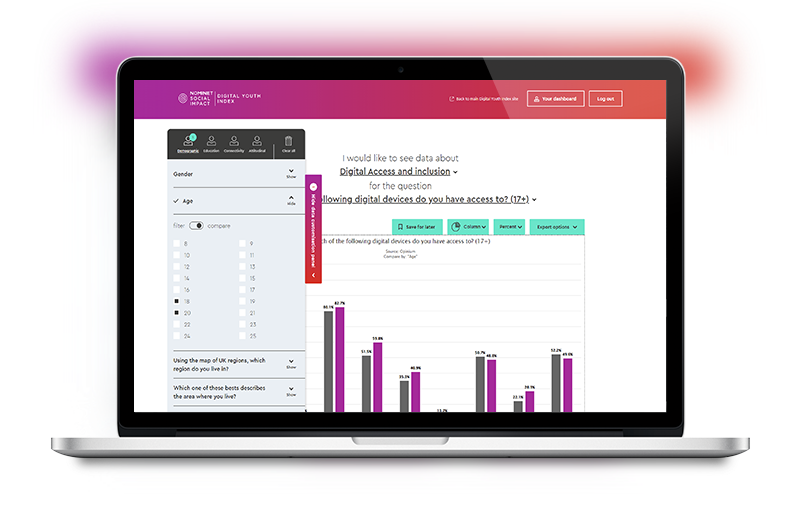Young people and adults are poles apart on internet safety
Most young people (94%) feel safe online
but parents and professionals working with
young people are less convinced
Insight
Most young people (94%) feel safe online but 83% of young people aged 11 or above have experienced something that they found upsetting, including fake news, hate speech, sexual content and contact with strangers. When asked about online safety in the qualitative research, young people predominantly thought first about data protection and keeping their personal details safe. Among the 6% who did not feel safe, the most common reason for feeling unsafe was concern around theft of personal information or identity theft.
While a similar proportion of young men and women feel unsafe online (4% of young men vs. 6% of young women), young women are more likely to have seen or experienced something upsetting online. Nearly a third (30%) of females aged 12 years or over have been asked to share inappropriate or sexual images compared to 14% of males. A similar difference is also seen for content promoting dangerous eating habits; 27% of females have seen this vs. 14% of males.
Young people are aware of privacy settings across social media and gaming sites and, therefore, feel that the power is in their hands to accept or decline invitations. However, throughout the qualitative research we observed that young peoples’ knowledge of and engagement in internet safety varied and they sometimes spoke about superficial measures, or beliefs such as that the brand of phone they use would keep them safe online.
Parents and professionals working with young people tend to be more aware of safeguarding issues and express concerns that young people may be naïve about their vulnerabilities. Although, parents may say that they are confident that their child would know how to respond to different situations, they are sometimes shocked at the choices their children make.
Why does this matter?
The index shows young people feel safe online but when you dig deeper into this sentiment, it most often relates to issues such as personal data and protecting their identity. This is in contrast to concerns raised about disturbing content, grooming, or bullying when parents or carers are asked the same question. Among parents and carers, there remain high levels of anxiety and worry about how safe the online world is for young people. We need to ensure that the young and older people in these critically important relationships are talking the same language by fostering good conversations and finding shared understanding around the ever-evolving landscape of internet safety and digital resilience.
Implications
- Why are messages of internet safety (beyond data protection) not landing with young people?
- How much of internet safety is down to the individual (their own skills and resilience) and which factors are the responsibility of the platforms, products and services? And what are the implications for supporting young people?
- Where does a young person’s right to privacy meet a family or society’s duty to protect from harm? How can these be complimentary over mutually exclusive?
- How can we build a shared language to ensure we’re on the same page when it comes to internet safety?




